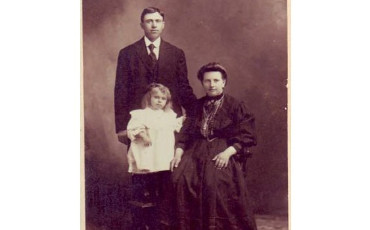Dust Bowl days began early

By FREDERICK LEO WELK
As told to his son, Frederick Jr.
The origin of the surname Welk is given in various name history sources as meaning “foreigner” or “wanderer.” For hundreds of years that has been an apt label for many members of the clan, who ranged from Alsace to Southern Russia then to Dakota always looking for a better place and better times My father lived until 2013, a few months short of his 100th birthday. He frequently commented on having lived from the "horse and buggy days to the computer age."
“All of a sudden came the Depression. Why aren’t we getting the crops? As Dad would say time and again, “All we need is rain. All we need is rain.” But we never got rain. But we got a lot of wind out of the northwest from Canada. It came down and made the Dust Bowl. Now you’ve heard about the Dust Bowl. You’ve heard about Oklahoma and all that. But remember it started up in Dakota, — North Dakota, South Dakota, Nebraska, Oklahoma, Texas— it all came down there. History books will tell you about Oklahoma, Texas and all that. It started all up in Dakota all the time —that good soil that was plowed up —that the Indians used to walk on for thousands of years. And then that strong wind, since there was no rain no more, it became kind of dust. So it made the Dust Bowl. Just dust, dust, dust. So, there we were year after year. Every spring we would farm it, we would have enough money to have seed so we could farm it and say, “Well, this year we will make it.” Nothing. For seven years it was like that. Seven years of hard work and nothing to come out of it.”
No hay for the cattle
“Anyway, for the cattle— we still had cattle. You know what a Russian thistle looks like? You have heard of Russian thistle? I used to go out and we would cut it and brake that up and make that food for the cattle in order for them to survive. That’s how it was. That’s how tough it was year after year. So anyway, this all happened by 1929. Then the stock market crashed and whole country went haywire. But we were already in the Dust Bowl and thought nothing of it. Because we had nothing anyway. So, the government thought they would try to help the farmers some. They would ship from other states somewhere— they would bring in box cars of hay and put it on the siding for the farmers. For some reason our farm didn’t get any. My Dad didn’t get any as he was considered too rich.
“So, what happened? (Henry A.) Wallace, the Secretary of Agriculture under (Franklin) Roosevelt at the time decided it. So, we couldn’t get any of that hay. They would come along and buy the cattle— some of it— and kill it and bury it! You think this was comical? But thousands of animals were shot and buried and the hay was on the side track. There was the hay that could have been fed to the cattle. But no! That was Wallace and Roosevelt’s idea. So, we never got part of that. That was part of the sadness of the Depression Days. Mother passed away soon after. Then I did nothing more than hard work. Trying another few years of farming but nothing good ever happened. In the meantime, my brothers, Frank and Clem, were older than me and they decided to leave and they went out West because there was nothing in Dakota no more. I stayed there with the family and finally Dad died. So then I was left with children younger than me. There was Mary, Becky, Aggie, Peter, Dorothy and Bea. My oldest sister Barbara had gotten married to Joe Sitter, so she and Joe took over our house. And our next oldest sister, Mary, stayed there. She was dating some guy at the time. But the farm, we had over 1,000 acres, we just let it go for taxes —just left everything. There was nothing you could do. Nobody wanted it. We just left it. Just got in the car and went out West and so we started all over again.”






